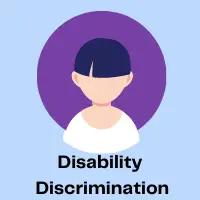What is Disability Discrimination?
Your questions about workers’ rights, answered

Disability discrimination laws protect your rights. The workforce includes nearly 6 million people with disabilities, a number that is likely to increase.
But what is disability discrimination? Can you sue for disability harassment? And what are the exceptions to disability discrimination laws?
Disability discrimination means treating an employee or job applicant differently because of their disability. It also protects people with a former disability or a perceived disability.
You are entitled to a working environment free from disability discrimination.
Our Disability Discrimination FAQ explains the definition of disability discrimination and how to protect your rights if you experience discrimination in the workplace.
What is disability discrimination?
Disability discrimination means treating a job applicant or employee unfavorably because of their disability status. Disability discrimination laws also cover people with a prior disability or a perceived disability.
In addition to federal protections, state and local disabilities laws also ban disability discrimination and require reasonable accommodations for people with disabilities.
What are examples of disability discrimination?
In the workplace, disability discrimination can take multiple forms. For example, employers cannot make employment decisions like hiring or firing based on someone’s disability rather than their skills or abilities.
Creating a hostile work environment by targeting a disability also qualifies as disability discrimination.
Another example of disability discrimination covers employers who refuse to provide reasonable accommodations for a disability.
What is the law on disability discrimination?
At the federal level, the Americans with Disabilities Act (ADA) protects people from discrimination because of their disability status. The ADA forbids discrimination in hiring, firing, pay, promotions, training, and benefits.
In addition to the ADA, many state and local laws protect employees from disability discrimination. Some of these laws offer stronger protections than the ADA.
For example, the New York Human Rights Law applies to private companies with more than four employees, while the ADA only applies to private companies with more than 15 employees.
What is a reasonable accommodation?
Under disability discrimination laws, including the ADA, employers must provide a reasonable accommodation for an employee’s disability. This can include a modification in the job requirements or an adjustment to the typical procedures.
Employees must be able to perform the essential functions of the job to qualify for reasonable accommodations. For example, a blind job applicant cannot perform the essential functions of a job as a bus driver.
However, requesting a reader for a hiring test would be a reasonable accommodation for a blind job applicant who can perform the essential functions of the job.
If an accommodation represents an undue hardship because of its expense, difficulty, or disruptive nature, the law does not require an accommodation.
What constitutes disability discrimination?
Disability discrimination occurs when an employer treats a job applicant or employee less favorably because of a disability or perceived disability.
This can include withholding better job assignments because of an employee’s disability, denying certain benefits to an employee with a disability, or refusing to hire a job candidate with a perceived disability.
Disability harassment in the workplace also qualifies as a form of disability discrimination.
What is an example of indirect discrimination?
In addition to direct disability discrimination, such as refusing to hire a job applicant with a disability, the law protects employees from indirect discrimination.
But what is indirect discrimination? Indirect discrimination occurs if a company policy negatively impacts people with disabilities. This can include a requirement that all employees have a driving license when driving is not an essential job function.
Indirect discrimination can also violate the law if employers refuse to provide a reasonable accommodation.
What is disability harassment?
Disability harassment includes offensive comments, abusive behavior, or hostile conduct that targets a disability or people with disabilities.
In the workplace, disability harassment can mean offensive jokes about a disability, hostile comments aimed at an employee about their disability, or taunting someone about a perceived disability.
If disability harassment creates a hostile work environment, you may be able to file a lawsuit against your employer.
How do you prove disability discrimination?
In order to prove disability discrimination in the workplace, you can start collecting records documenting the discrimination, any conversations you had with human resources or your supervisor, and statements from witnesses to the discrimination.
In the case of disability harassment, evidence of the harassment will help when proving disability discrimination.
A disability discrimination lawyer can help make the strongest possible case for disability discrimination.
What can you do about disability discrimination?
Victims of disability discrimination can file a lawsuit against their employer. Learn more about disability discrimination protections, discrimination laws, and potential damages.
A discrimination lawyer can help protect your rights.
In the greater New York City area, contact New York discrimination lawyer Charles Joseph for a free consultation. Charles Joseph brings over two decades of experience with workplace discrimination cases, and his firm has recovered over $140 million for clients.
